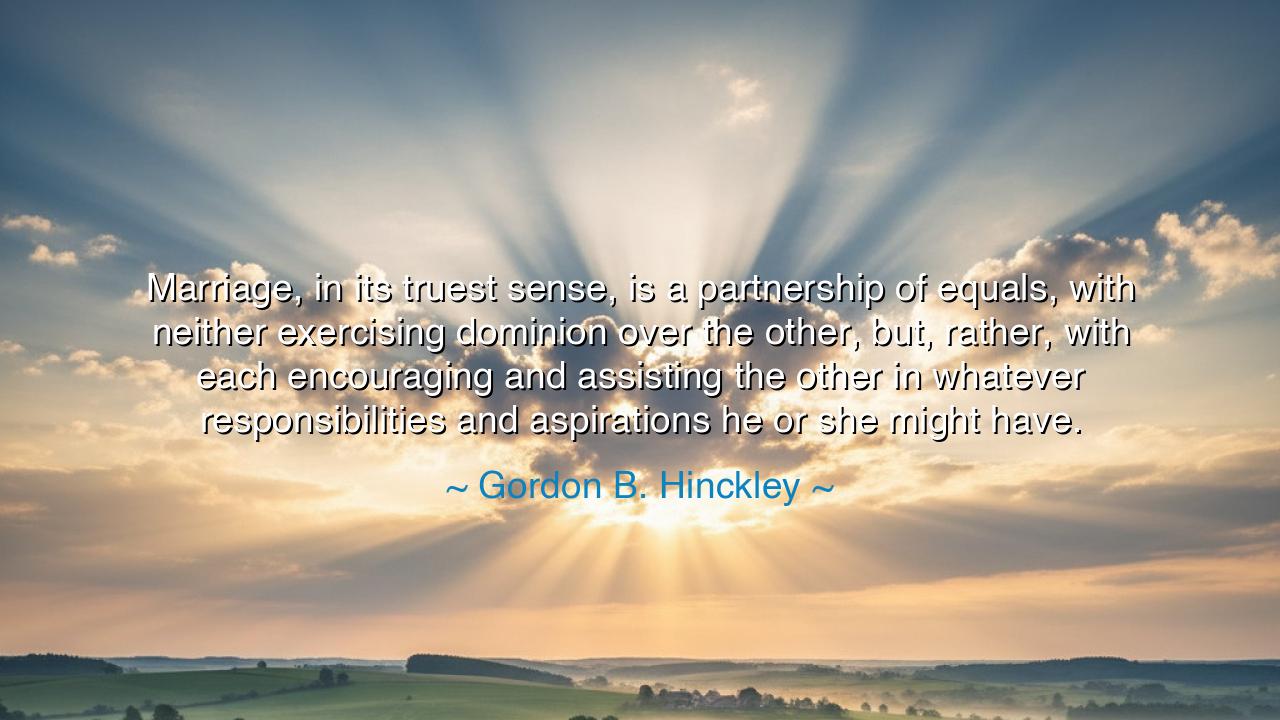
Marriage, in its truest sense, is a partnership of equals, with
Marriage, in its truest sense, is a partnership of equals, with neither exercising dominion over the other, but, rather, with each encouraging and assisting the other in whatever responsibilities and aspirations he or she might have.






The words of Gordon B. Hinckley — “Marriage, in its truest sense, is a partnership of equals, with neither exercising dominion over the other, but, rather, with each encouraging and assisting the other in whatever responsibilities and aspirations he or she might have.” — speak with the quiet strength of eternal truth. They are words forged in wisdom, not of fleeting romance, but of enduring companionship — the kind that weaves two lives into one shared purpose. In this teaching, Hinckley, a man revered for his faith, humility, and leadership, reveals the sacred architecture of true marriage: a bond not built on authority or submission, but on equality, mutual respect, and divine cooperation.
In the world of the ancients, many unions were founded upon hierarchy — man ruling over woman, power overshadowing partnership. But Hinckley’s vision restores what was always meant to be: a balance of souls, each reflecting the other’s light. His words recall the wisdom of the Creator’s design — that man and woman were not made one to dominate, but to uplift; not to compete, but to complement; not to possess, but to support. For where love is pure, there is no room for tyranny, and where equality reigns, love flourishes like a tree rooted in both strength and gentleness.
Gordon B. Hinckley, who served as President of The Church of Jesus Christ of Latter-day Saints, often spoke of the sacredness of marriage as the cornerstone of both faith and civilization. His teachings were not those of lofty philosophy alone, but of deep humanity. Having shared more than sixty years of marriage with his beloved wife, Marjorie, he lived the very truth he taught. Their union was not a display of dominance or duty, but of joyful partnership — a harmony of two hearts working as one. Through their mutual devotion, they exemplified what Hinckley declared: that true marriage is not about control, but about cooperation, not about self, but about shared purpose.
The meaning of this teaching is timeless and profound. Marriage, in its truest form, is a covenant of equals — a daily choice to nurture another’s dreams as faithfully as one’s own. It is an agreement to serve, to forgive, to listen, and to grow together. When one stumbles, the other steadies; when one succeeds, the other rejoices. Each becomes the other’s mirror and guide, their companion in the wilderness of life. There is no dominion, for dominion destroys intimacy; there is no servitude, for servitude poisons love. Instead, there is partnership — a union where the strength of one fills the weakness of the other, and together they become something greater than either could be alone.
The ancients left us stories of such unions — rare, but radiant. Consider the tale of Odysseus and Penelope, whose marriage endured twenty years of separation and trial. While Odysseus faced monsters and storms across the seas, Penelope ruled their home with grace and wisdom. She resisted the suitors who sought to claim her, not out of helplessness, but out of faith and loyalty. When Odysseus returned, it was not as a conqueror reclaiming what was his, but as a partner reuniting with his equal. Their love was tested by distance, but made unbreakable by respect. Like Hinckley’s teaching, their story reminds us that marriage rooted in equality survives what domination never can — the storms of time, pride, and change.
Hinckley’s wisdom also carries a lesson for the present age, where too often, the sacred meaning of partnership is forgotten. In many homes, pride takes the place of patience, and one voice seeks to rise above the other. Yet where there is imbalance, love withers. True happiness is found not in commanding, but in encouraging; not in demanding obedience, but in fostering growth. To assist one another — in both duty and dream — is to honor the divine purpose of marriage itself. For in uplifting the other, we are uplifted; in helping our partner fulfill their calling, we fulfill our own.
And so, my children, learn from this: marriage is not a throne, but a table set for two — where love, respect, and faith are shared daily. Speak kindly, for your words shape the heart beside you. Listen deeply, for understanding is the root of peace. Let no pride divide what love has joined, and let no silence harden where words can heal. Be your partner’s strength in weakness, and their solace in sorrow. Walk side by side, neither before nor behind, but hand in hand toward the same horizon.
For as Gordon B. Hinckley teaches, when marriage is lived as a partnership of equals — with compassion instead of control, encouragement instead of dominance — it becomes not merely a bond between two people, but a reflection of divine harmony itself. Such a union is not fragile or fleeting; it is eternal. It is the kind of love that endures beyond hardship, that grows deeper with time, and that stands as a living testimony to the sacred truth that two souls, when equal in love and purpose, can move mountains together.






AAdministratorAdministrator
Welcome, honored guests. Please leave a comment, we will respond soon